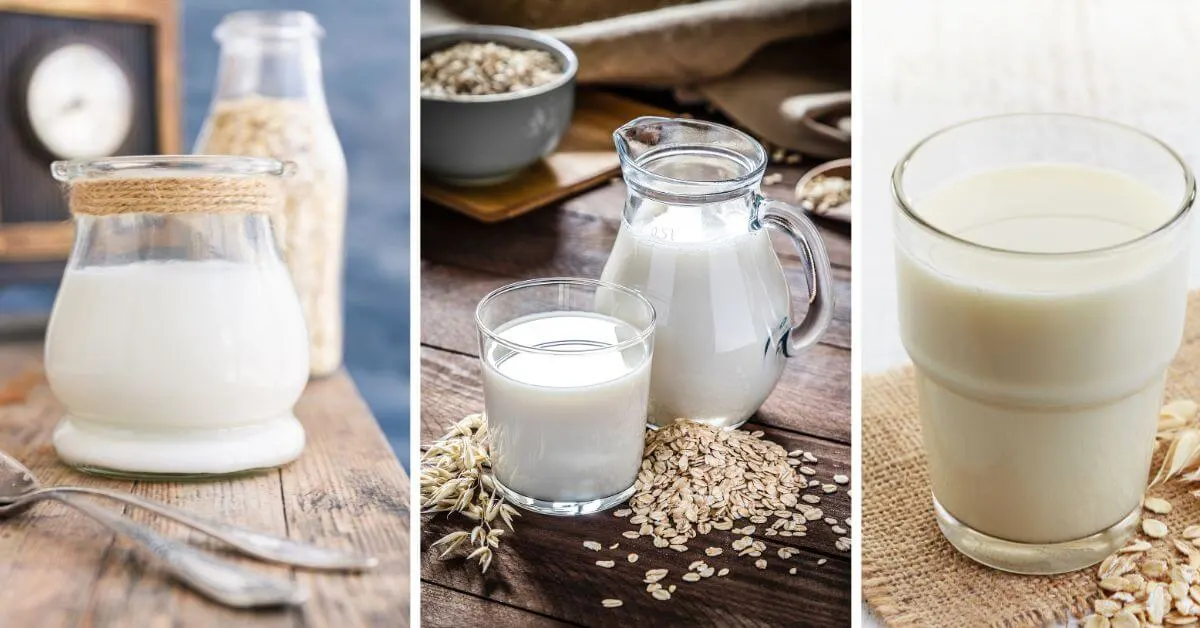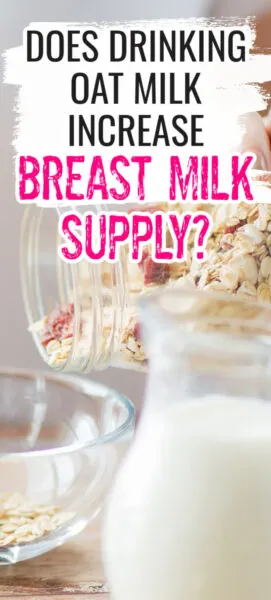Updated November 13, 2022
There are a lot of myths and old wives’ tales out there about what you can do to increase your milk supply when you’re breastfeeding.
From eating certain foods to taking certain supplements, it seems like there’s no end to what people will tell you will “boost” your milk production.
But does oat milk increase milk supply?
Let’s talk about it because having a low milk supply is not uncommon and breastfeeding can be shockingly hard, stressful, and scary when things are not going right.

Does oat milk increase milk supply?
Yes, oat milk may help increase breast milk production.
But what we don’t know is if it is from the oats or from increased fluid intake.
Oatmeal is often recommended as a food that can help increase milk supply.
This may be because it contains beta-glucans, which are types of fiber that can stimulate the release of prolactin (a hormone that helps with milk production).
Oats are a common Galactagogue used by women to increase their milk supply.
Galactagogues are substances that may help you increase breast milk production.
Almost 60% of breastfeeding women who have used a Galactagogue have used oats.
Oats are a popular choice for women looking to increase their milk supply.
This is true across cultures and countries.
How exactly eating oats or drinking oat milk helps improve milk supply is not well understood.
All of the studies we looked at found little to no difference between taking Galactagogues or a placebo.
But don’t let that deter you from drinking oat milk while breastfeeding.
One of the biggest influences on milk supply is hydration level.
New moms can easily become dehydrated in the postpartum period.
Maintaining adequate hydration is crucial for breastfeeding moms.
An adult should drink 64 ounces of water each day (eight 8-ounce glasses).
According to our OB/GYN Dr. Doug Penta, MD. “While breastfeeding a woman should drink an extra quart, or an extra 32 ounces each day.”
It can be easy to get dehydrated as a new mom.
Most new moms are not told this when they are discharged from the hospital to home after their delivery.
The best way to be sure you are drinking enough is to always keep a water bottle with you.
If you hate plain water, try using a water infuser and adding some fresh fruit to your water.
You can also make your own flavored water by adding a few slices of cucumber and mint, or berries and lemon.
There are many ways to increase your water intake throughout the day.
The important thing is to make sure you are drinking enough.
Many women find that their milk supply decreases when they become dehydrated.
You also need to be eating enough.
You should be consuming an extra 500 calories a day in order to help ensure you have an adequate milk supply.
That can be hard when you are in a rush to lose the weight you gained while pregnant.
If you want to breastfeed exclusively, you may have to prioritize having a good breast milk supply over weight loss in the first few months after delivery.
The best thing you can do to increase your chances of successful breastfeeding is to take a breastfeeding class.
Breastfeeding is not always easy and low milk supply is not uncommon.
The World Health Organization (WHO) recommends exclusive breastfeeding for the first six months of life.
But many breastfeeding women do supplement with formula or decide to switch to formula altogether before their baby reaches 6 months of age.

Is oat milk good for breastfeeding moms?
Oatmilk is not harmful and can be part of a healthy diet while breastfeeding.
If you are looking for a non-dairy alternative to cow’s milk, oat milk is an excellent choice.
Oatmilk is our choice of “milk” and we use it in place of cow’s milk every day.
Overall water is the best choice, but adding an additional glass of oat milk a day may be helpful.
Especially if it helps you consume more fluids than you would when not breastfeeding.
How does eating oats help increase breast milk supply?
Eating oats and oatmeal may help increase breastmilk supply.
This is because oats are thought to be a Galactagogue.
Galactagogues are substances that may increase breast milk supply and they can be pharmacologic and non-pharmacological.
There have not been any conclusive studies that prove eating or drinking oats increases breast milk.
It is worth trying though.
Oat milk is packed with iron and other nutrients that can help increase your postpartum energy levels, which may also aid in increased milk production.
Because increasing your fluid and food intake is proven to help increase milk production.
Try having oat milk in your bowl of oatmeal in the morning!
How long after eating oatmeal will breast milk supply increase?
If your low supply is due to dehydration and you drink enough oat milk, you should see an increase in your supply in 24-48 hours but some women have reported it taking two weeks to see improvement.
The key is to keep drinking plenty of fluids and to increase your breastfeeding or pumping schedule.
Does almond milk increase milk supply?
Nursing mothers have long been advised to drink plenty of fluids, eat a healthy diet, and get enough rest in order to maintain a good milk supply.
Recently, however, some women have begun turning to almond milk as a way to increase their milk production.
If you prefer almond milk to other beverages then you should drink it.
Almond milk is mostly water and getting enough water is crucial for developing a strong milk supply.
Does coconut milk increase milk supply?
Drinking plenty of fluids is so important during breastfeeding.
If you enjoy coconut milk and it helps you get adequate fluids then yes coconut milk may help you increase your milk supply.
But there are no studies that conclusively link drinking coconut milk with an increase in breastmilk.
Adding Coconut milk to your diet while breastfeeding can help you meet the requirement for an extra 500 calories a day.
Oat milk vs almond milk for breastfeeding
It doesn’t matter which non-dairy milk you choose.
They are mostly water.
Drinking them can help you stay well hydrated which is critical for ensuring you have an adequate milk supply.
Best oat milk for breast milk production
The best oat milk for breast milk production is the oat milk you will drink.
You should drink the one you like the best.
Because if you like it, you’ll drink more of it, and drinking more is critical when it comes to having a good milk supply.
Helpful tips for increasing your milk supply:
- Breastfeed more frequently. Milk supply is based on supply and demand.
- Drink plenty of fluids. More than you think you need.
- Get more rest. Exhaustion and fatigue can decrease milk production
- Eat more. You need an additional 500 calories a day to produce enough milk.
- Try pumping and power pumping.
- Try using a warm compress and breast massage before breastfeeding or pumping
- Take a warm shower before feeding.
- Relax
Avoid things that can decrease your milk production:
Paying attention to the following can offset how hard you will have to work at increasing your milk production:
- To maintain an adequate breast milk supply, always keep yourself hydrated and consume enough calories.
- Avoid diuretic foods and supplements.
- Try not to go too long between feedings or pumping sessions, as this will make it harder to produce milk.
- To increase milk production, wear loose clothing, take hot showers, and nurse/pump often.
Is my baby getting enough breast milk?
To be sure your baby is getting enough breast milk it is critical to monitor the following parameters:
- Are you changing at least 6 wet diapers each day after the first few days of colostrum?
- Is your baby latching on properly and feeding every 2 to 3 hours?
- Does your baby seem content after breastfeeding?
- Is your baby sleeping between feedings?
- Are your breasts softer (not engorged) after breastfeeding?
- Can you visibly see your baby swallowing milk?
- Is your baby having two or more bowel movements during the first few weeks?
Weight gain is the most objective indication your baby is getting adequate calories.
Though breastfed newborns can lose up to 10% of their body weight during their first few days of life, subsequent consistent weight gain is the best indication your newborn is getting adequate nutrition (calories).
The early weight loss is usually gained back within 2 weeks.
When your baby starts gaining weight, weight gain should be up to 8 ounces over the following 4 weeks.
What are the signs my newborn is not getting enough milk?
These may be signs that your baby is not getting enough breast milk.
If you see any of these things in your newborn you should contact your pediatrician right away.
- Less than 6 wet diapers a day after the first 5 days.
- Your newborn doesn’t gain weight after the initial weight loss.
- Your newborn starts losing weight, once weight gain has begun.
- After the first 5 days, stools are dark and small.
- Urine is concentrated (dark yellow).
- If your breasts are still engorged after breastfeeding.
- Your newborn is irritable and does not seem content after feeding.
- Your newborn is lethargic when he/she should be feeding and does not latch on properly.



